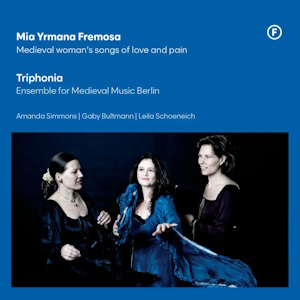
Mia Yrmana Fremosa
Medieval woman’s songs of love and pain
Triphonia – Ensemble for Medieval Music Berlin
rec. 2009, St.Albertus Magnus Kirche, Berlin
Fineline FL72423 [71]
Challenge Classics have re-released this 2009 disc (CC72385, reviewed by Dominy Clements in 2010) on their new label Fineline. A programme on twenty-six tracks comprises short songs and instrumental pieces from the 12th and 13th century. Around a half have known authors, others are anonymous.
The role of women in that period has been underestimated and misunderstood. The husbands and sons could well be away at the Crusades, but the property had to be maintained, the servants and younger children cared for and disciplined, and the management of the estate or the farm continued. After all, the men might well not return. Yet few poems by the trobairitz, female musicians and storytellers, have survived, and no tunes as far as we can tell. Men, it seems, also wrote songs that centred on the worries and fears of women, among them the pieces on this recording by the Galician composer Martin Codax (fl.c.1250).
After a short prologue, we have the seven songs which make up Codax’s Cantigas de amigo. They exist in manuscript only as monody, but the recording adds vocal lines and instrumental interludes and accompaniments – percussion, recorders and so on. I like such increased interest and colour. This is one of the earliest known song-cycle, as we might call it. The story takes place in Vigo (now a rather horrid industrial town). A young woman fruitlessly awaits the return of her lover from across the sea.
That is the first main section, By the Sea. The next is Mother-Daughter Dialogues, five pieces including an estampie composed in a very authentic style by Gaby Bultmann, one of the three performers. The main song is by the German Minnesinger Neidhart von Reuental (d.c.1240). In Blözen wir den anger ligen,a young girl on a spring morning wants to converse, or more, with a knight but her mother considers him rough and unsuitable.
Perhaps this might eventually lead to the next section, La malmariée [the unhappily married]. The central panel of this section is the chanson Trop est mes maris jalos by Etienne de Meaux (fl.c.1250). Here we have a jealous husband whose wife is, one might say, a little slippery.
The section named Laments follows. The central piece, by Richard de Fournival (1201-1260), is the lengthy Motet & Chanson de femme: Onques n’amai tant que jou fui aimee. He is also known as the writer of a book entitled Le Bestiaire d’amour. The chanson concerns a lover who never gives up even though his love is not reciprocated.
Finally, we have Celestial Love, four anonymous songs. Two are German and one comes from the Cantigas de Santa Maria, said to have been written under the guidance of King of Castile and León, Alfonso X the Wise (1221-1284). The song is entitled De vergonna nos guardar.
The motet Endurez, endurez les dous mas d’amer [endure the sweet and the bitter (?)] appears six times: as the prologue, the epilogue and before four of the sections. Each time it is differently performed. The three artists of Triphonia, very versatile, play a variety of medieval instruments for added fun and colour. That includes the riqq, an Arabic tambourine. (The crusaders who came home brought back instruments which they had probably bartered whilst on their travels.)
I have increasingly come to enjoy and admire Triphonia’s vocal presentation as I have listened. Theirs is what we might call a folksy style, but their voices are focused and cultured. The included booklet contains only a list of pieces, a photo and a skimpy essay, but a more complete one from the original release can be downloaded (unfortunately the URL provided is incorrect – it should be challengerecords.com/booklets/fl72423).
Gary Higginson
Buying this recording via a link below generates revenue for MWI, which helps the site remain free



Contents
1. Prologue
2-10. By the Sea
11-15 Mother-Daughter Dialogues
16-18. La malmariée
19-21. Laments
22-25. Celestial Love
26. Epilogue
Performers
Amanda Simmons: voice, Romanesque harp, tambourine, castanets, scallop shells
Gaby Bultmann: voice, vielle, psaltery, recorders, stringed tabor, bells, frame drum, riqq
Leila Schoeneich: voice, recorders, stringed tabor, frame drum

















